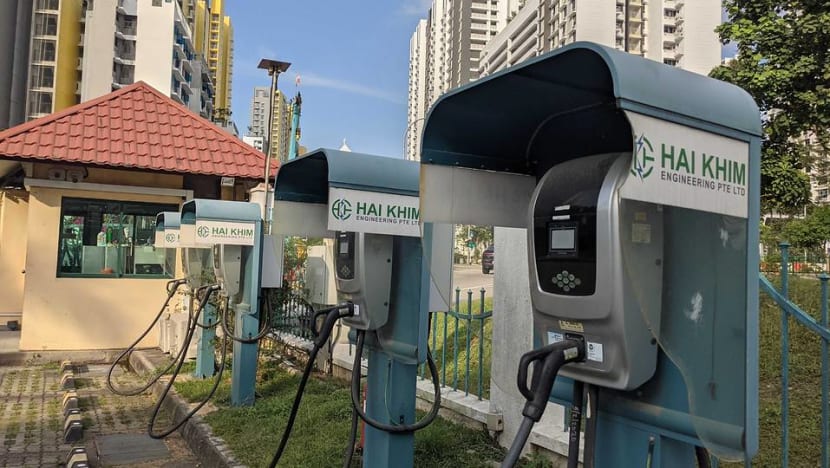Obstacles remain in electric vehicle adoption despite incentives, say transport experts and drivers

Electric vehicle charging points at a carpark in Punggol. (Photo: Zhaki Abdullah)
SINGAPORE: Few available models, high prices and a lack of charging stations - these are some of the reasons why it may be some years before motorists in Singapore switch to electric vehicles (EVs) in large numbers.
This is even as the country is set to introduce a wide range of incentives aimed at encouraging the adoption of EVs here.
Deputy Prime Minister and Finance Minister Heng Swee Keat announced in his Budget speech on Tuesday (Feb 16) a slew of incentives aimed at narrowing the "cost differential" between EVs and internal combustion engine (ICE) cars.
These include lowering the Additional Registration Fee (ARF) floor to zero for electric cars from January 2022 to December 2023, as well as revising road tax bands to allow “mass-market” electric cars to have road tax comparable to an ICE car equivalent.
Meanwhile, the EV Early Adoption Incentive kicked in last month, allowing those who buy electric cars or taxis a rebate of up to 45 per cent on the ARF, capped at S$20,000.
“It has been proven in other countries that incentives are the most effective way to increase the sales of EVs,” said Singapore University of Social Sciences (SUSS) urban transport expert Park Byung Joon.
READ: Budget 2021: More incentives to encourage early adoption of electric vehicles
Government incentives for EVs led to a significant uptake of such vehicles in China - where more than 1.3 million EVs were sold last year - and Norway, where more than half of all new cars sold last year are electric-powered.
However drivers here may not be switching to EVs anytime soon.
“The models of EV cars are still very limited,” notes Singapore Vehicle Traders Association (SVTA) president Eddie Loo.
Even though electric car giant Tesla is set to reenter the local market after almost a decade, there are still only a handful of electric car models available for sale in Singapore, such as the BYD e6 and the Nissan Leaf.
Affordability is another issue, said Mr Loo, who is also the managing director of motor dealer CarTimes Automobile.
A Hyundai Ioniq Electric currently costs upwards of S$150,000 here, while the hybrid version of the Ioniq costs a little over S$100,000.
Although Mr Melvin Lim - who recently sold off his car - is open to buying an electric vehicle, cost is a major consideration for him.
“My main consideration is budget, I will set a target of how much monthly installment I want to finance, and the next factor will be if the car is a hybrid fuel type,” said the 40-year-old technical manager.
READ: 'It’s really unfair': Delivery, ride-hailing drivers baulk at petrol duty hike
LISTEN: Electric cars: When’s a good time to start thinking about buying one?
TACKLING RANGE ANXIETY
Motorists may also be hesitant to latch on to new technology, said SVTA’s Mr Loo, adding that the widespread adoption of EVs here may not happen until at least 2030.
He pointed to Singapore’s experience with compressed natural gas (CNG) vehicles.
CNG - once touted as a cleaner alternative to petrol here - failed to take off due to factors such as a lack of refuelling stations and higher costs once Government rebates on CNG fuel dried up.
Singapore motorists who are used to driving into Malaysia may also face difficulties in recharging EVs across the Causeway when borders reopen, added Mr Loo.
Software engineer Justin Lee, who is planning to buy a Tesla Model 3, said he would “definitely keep a petrol car around” for trips to Malaysia to avoid range anxiety.
The 39-year-old said while the Government now aims to encourage the use of EVs, he hopes there will not be a hard deadline for motorists to make the change. For instance when it was announced in 2018 that older motorcycles would be banned from the roads from July 2028, said Mr Lee.
READ: Amid push for electric vehicles, getting charging points installed in condominiums remains a challenge
One of the measures aimed at encouraging the use of EVs is the provision of 60,000 charging points at public car parks and private premises by 2030 under the Singapore Green Plan 2030.
“To ensure that the mass adoption of electro-mobility has a viable chance here, a developed charging infrastructure is key,” said BMW Group Asia managing director Christopher Wehner.
“While the deployment of 60,000 charging points by 2030 is an encouraging step in the right direction, it’s also important that we continue discussions with the relevant industry bodies to better facilitate the installation of chargers at HDBs and private developments such as condominiums, for example,” he added.
Software engineer Mr Lee suggested the authorities could design a payment framework that can be shared across different EV charging networks, similar to how in-vehicle units (IU) are now used for payment across different carparks in Singapore.
“This would allow people to park and charge anywhere,” he said.
READ: Local firm to install 4,000 electric vehicle charging points in 1,200 condos by 2030
BMW’s Mr Wehner said incentives should also be extended to plug-in hybrids, describing them as a “stepping stone” for consumers while Singapore’s EV charging infrastructure grows.
The German automaker - which has two fully-electric vehicles and five plug-in hybrids on the market in Singapore - has sold more than 500 EVs in Singapore to date, a number it expects to grow as more electric models are introduced here.
Although there are environmental considerations with EVs - such as the replacement and disposal of depleted car batteries - they remain the “sole practical alternative” for ICE vehicles, noted Associate Professor Park of SUSS.
Motorists here are still likely to choose larger ICE cars for now, as has been the trend, he said, although Government incentives may push more to choose electric cars over time.
“We will definitely see more EVs on the road,” he said.
With new green targets announced by the Singapore Government, when will we be seeing more electric vehicles on our roads? And will town council and condominium committees get involved? An energy expert and a business professor weigh in on CNA's Heart of the Matter:












